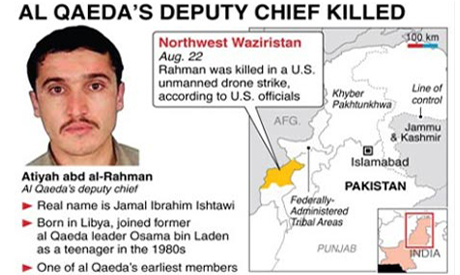
Map of Pakistan and illustrated profile of Atiyah al-Rahman, al Qaeda's deputy chief killed in a U.S. drone strike earlier this week (Reuters photo)
Pakistani officials said that they still had no confirmation on Monday that Atiyah Abd al-Rahman, Al-Qaeda's deputy chief, had been killed in a recent US drone strike near the Afghan border, two days after American officials said his death was a major victory in its war against the group.
Rahman, a Libyan national, rose to the number two spot when Ayman al-Zawahri took the reins of Al-Qaeda after Osama bin Laden was killed in May in a US raid in Pakistan.
US officials said he was killed on 22 August in North Waziristan, a global hub for some of the world's most dangerous militants, from Al-Qaeda figures to the Pakistani Taliban to veteran foreign fighters from the Arab world.
Eliminating Al-Qaeda leaders operating along Pakistan's unruly frontier with Afghanistan is a security priority for the United States, which has stepped up its drone attacks there under the Obama administration to achieve its goal.
Pakistani officials said they had no information that indicated that Rahman was killed in a drone strike three weeks before the tenth anniversary of the September 11th attacks on the United States.
"We made checks but we have no confirmation from any source as yet about this death," a senior Pakistani military official said.
His comments highlighted the deep intelligence deficit Pakistani officials often face in North Waziristan and other parts of the northwest, where rugged mountain terrain and ties between a murky militant network and powerful tribal hosts make the area difficult to penetrate.
Militants often bury their dead leaders quickly, making it hard to come up with evidence of their fate.
Pakistani officials don't always agree with Washington's assessment of the Al-Qaeda leadership structure. While one US official described Rahman as the Al-Qaeda's second-in-command, the Pakistani military official said Islamabad was not so sure.
"We don't know even whether he was number two or not," the official said.
What intelligence officials said they could confirm is that a missile fired by a remotely piloted US drone struck a car near the North Waziristan town of Mir Ali on 22 August, killing four militant followers of Hafiz Gul Bahadur.
Bahadur is the main Pakistani Taliban commander in the region, with close ties to the Afghan Taliban.
If confirmed, Rahman's death could be a major blow to Al-Qaeda, which is still reeling from the killing of its historic leader Bin Laden by US Navy SEALs in a secret raid in the Pakistani garrison town of Abbottabad on 2 May.
U.S. officials said Ayman al-Zawahri, Al-Qaeda's current leader, was "relying" heavily on Rahman to help guide and runthe group after Bin Laden's death.
Locating Rahman may have raised hopes that the United States will now find it easier to locate Zawahri, a former Egyptian doctor who was often described as the brains behind Al-Qaeda, while Bin Laden was seen as an inspirational figure.
"Osama bin Laden has been found here. Several senior Al-Qaeda leaders have been captured from here and if Atiyah abd al-Rahman's presence and death are also confirmed, then it will prove that they all are here," said Rahimullah Yusufzai, an expert in tribal and militant affairs.
Pakistani officials don't expect Rahman's death to scare Al-Qaeda away from Pakistan, where it has spent years forging alliances with local militant groups.
"The death of Bin Laden has done considerable damage to them Al-Qaeda. The drone strikes have also hugely weakened them as they have lost many people," said a senior security official in Peshawar, capital of the northwest.
"But there is no evidence as yet to suggest that Al-Qaeda men are leaving tribal areas any time soon," the security official added.
Yusufzai said Al-Qaeda was on the run in Pakistan, a strategic US ally seen as critical to American efforts to pacify the Taliban in Afghanistan.
"It's very difficult for it to plan attacks from here. It is now a question of life and death for them here," he said.
Short link: